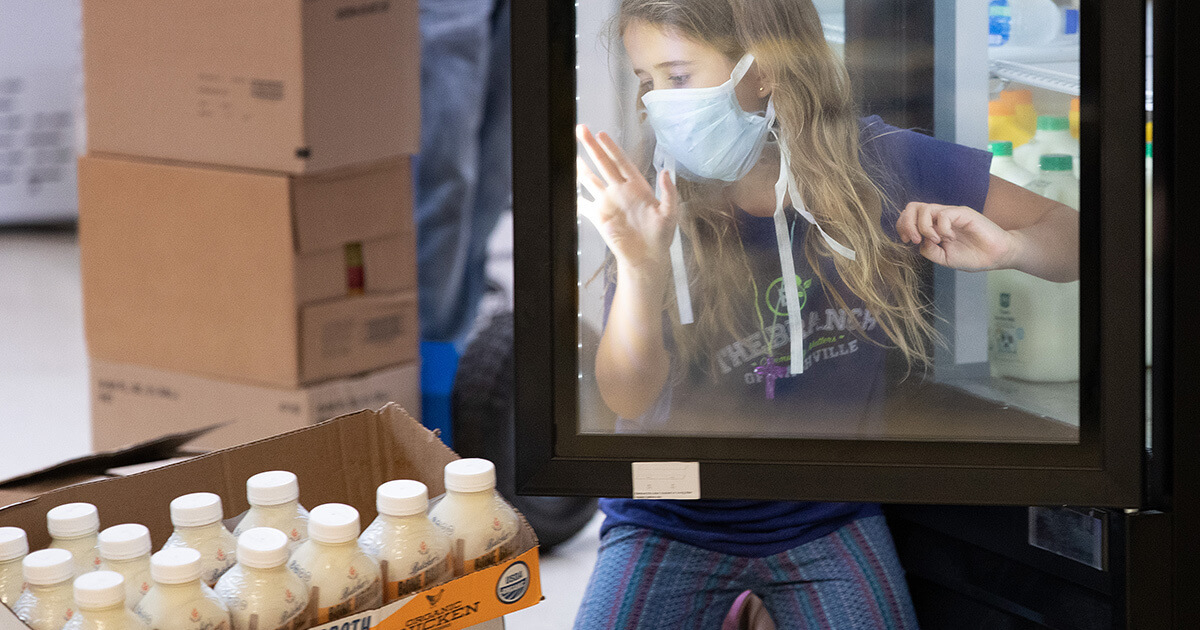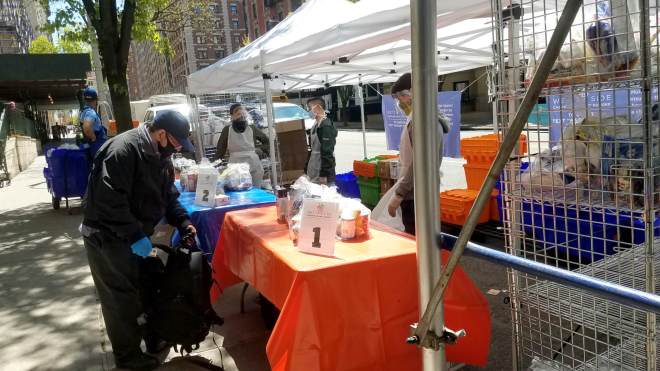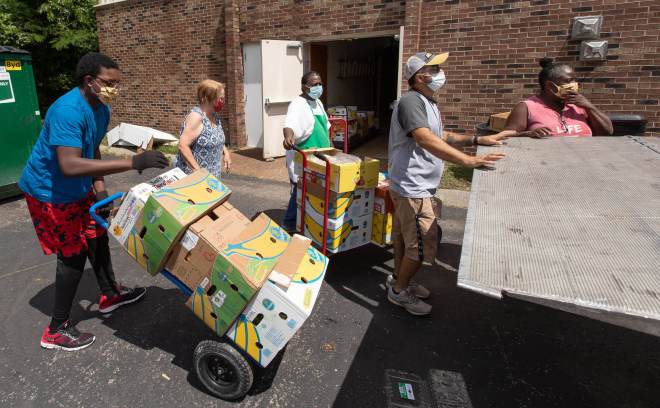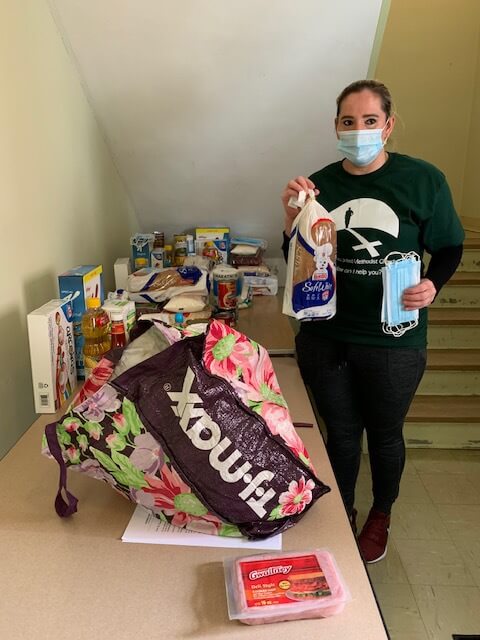In service to our communities

Churches use UMCOR Sheltering in Love grants to supply food to immigrant communities across the United States
By Christie R. House
June 2020 | ATLANTA
Tongan and Samoan older adults in Seattle, Hispanic and Latino families in Maryland, Syrian refugees in northern Nashville and undocumented workers in New York City – these are just some of the immigrant communities that have turned to United Methodist churches across the U.S. for food, water, and necessary supplies to sustain their families during COVID-19 shut-downs.
With donations to the UMCOR COVID-19 response crossing the $1.5 million mark this week, the United Methodist Committee on Relief has released 145 Sheltering in Love and other solidarity grants for a total of $1,548,334 to church and social service partners who are stretching their resources to meet increased needs around the world.
United Methodist church buildings may be closed for congregational gathering and worship, but the churches are open for ministry, and some are busier than ever.
“This place is like a beehive,” exclaimed the Rev. James Cole, pastor of Antioch United Methodist Church in Davidson County, Tennessee. “It’s like the gospel is being fleshed out right before us.”

PHOTO: K KARPEN
That would be a beehive in which all the bees wear masks and work about six feet apart from each other in clean, disinfected areas.
Antioch UMC partnered with the Branch of Nashville, a food pantry and service ministry founded in response to widespread flooding in northern Nashville and Davidson County in 2010. This Christian-led organization with multiple partners discovered that once the flood waters subsided, the need in that part of Nashville did not subside, so the Branch of Nashville continued its services.
Before COVID-19 entered the U.S., the Branch was serving about 100 families a week, according to Melissa Thomas, the Branch’s executive director. Now, it serves three times that many, and the number coming for food still increases. They had to move operations to the larger space of Antioch UMC, about a mile away, to meet the demand.
Antioch UMC applied for an UMCOR grant to keep up with the utility costs, sanitation and hygiene needs and protective personal equipment to keep staff and volunteers safe.
Thomas notes that about 100 different languages are spoken in the Antioch area. Just recently, the Branch hired a Syrian refugee to help with the increase in food distribution. He was able to intervene for a Syrian family that needed food. The husband had his hours cut back and they could not keep up with the bills or provide food for their three children.
While about 60% of the people arriving for food are Hispanic, the rest are a mix of other ethnic groups in the community. Volunteers have increased to about 90 members a week. “They’re caring and stepping forward – and many are receiving food themselves,” Thomas explained.

PHOTO: MIKE DUBOSE, UM NEWS.
Serving immigrant communities
Most of the churches receiving Sheltering in Love grants have already begun ministries to meet the needs of the newly unemployed and homebound in their communities. By offering the COVID-19 grants, UMCOR has been able to come alongside churches to extend what they can do and the number of people they serve.
The First Tongan United Methodist Church in Seattle opened a seniors’ program in 2018. Once a week, the senior program brought together Tongan older adults for fellowship, exercise, a lunch, and a place to connect with the City of Seattle Human Services for counseling or referral to other services. A few Samoan seniors joined them.
The novel coronavirus abruptly ended the in-person gatherings, particularly for this age group. But the need for food began to rise, not just for this group, but for their families and others in the community.
“Now we give food out to everyone, no restrictions,” noted the Rev. Mausia Folau, the pastor at First Tongan UMC.
With help from ecumenical partners and a few businesses, Folau and First Tongan United Methodist Women volunteers pack 50 food boxes for pick-up twice a week. That was a big step, but they received more requests. The UMCOR grant will help them to prepare 70 food boxes, and it will also ensure that more nutritious food, especially proteins, are included.
“We have to make sure we have quality stuff in the box, like fish and eggs,” Folau noted.
Likewise, on the East Coast of the United States, El Buen Samaritano, a ministry of Hughes United Methodist Church in Wheaton, Maryland, increased food distribution to its Hispanic neighbors. Ingrid Figueroa, the Hughes’ church administrator, said that most of the people coming to the church for food are from Honduras, El Salvador or Guatemala.
Figueroa also describes this time in 2020 as busy. “We’re giving food to all the people that we can,” she noted. “Yesterday, we served 208 households. It’s a crazy time here, but, at the same time, good to help others.”
With the UMCOR grant, El Buen Samaritano is providing extra help to eight or nine families, particularly single mothers, families trying to sustain grandparents and small children, and others that have no means of income because of sudden job loss.
Karla and her husband lost their full-time jobs overnight. Figueroa says Karla came to the church looking for work. She needed to pay the internet bill, which was three months behind, so her children could continue their schooling online. They needed food, but their biggest concern was their children’s education.
The El Buen Samaritano project enabled the family to pay one major bill, for them, it was internet service, and receive food boxes each week. Karla came back and asked for extra flour. She was using the flour from her food box to make tortillas for a neighbor’s family.
“We’re hearing a lot of these stories, and it’s good to see these results,” Figueroa said.

PHOTO: COURTESY EL BUEN SAMARITANO
New families showing up every day
On the Upper Westside of Manhattan, the United Methodist Church of St. Paul and St. Andrew is celebrating 40 years of service with its nonprofit food security and social service agency, the West Side Campaign Against Hunger.
Today, in addition to the food pantry, WSCAH offers full referral services to its clients, a good portion of whom are Hispanic immigrants, but people of many ethnic groups, documented and undocumented, come for help from across New York City’s five boroughs.
“We are widely known in New York City’s immigrant communities as a safe place to come for help,” said the Rev. Dr. K Karpen, St. Paul and St. Andrew’s pastor.
WSCAH and its partners quickly increased services to meet the need for food in New York City during quarantine. But the church experienced a revenue drop and was finding it hard to keep the building open for WSCAH to operate.
A Sheltering in Love grant was used for utilities, personal protection supplies, increased sanitation services and cleaning. According to Karpen, the church had to convert 25,000sq. feet of the 33,000 sq. foot church into a giant food storage warehouse. The pews, empty of worshipers while services are held online, are now full of crates and cans of food, bags of grains, and fresh produce. Every weekday, staff and volunteers begin the task of packing food again.
Between WSCAH’s mobile service, which delivers food to 23 partner agencies for distribution, and the people coming to the church, 1,000 people a day are being fed. And people who come for the first time are surprised to find a case manager to help them navigate the complicated New York system of social services.
Sheltering in Love grants are making it possible for churches across the country and around the world to help their communities stay safe, well, and acquire the necessities they need to get through the global COVID-19 pandemic. Many churches in immigrant communities are serving those who live with no safety-net, state unemployment options, or $1,200 check from the U.S. federal government. Loved by God through caring church communities, they, too, receive the bread of life.
Christie R. House is consultant editor and writer with Global Ministries and UMCOR.

